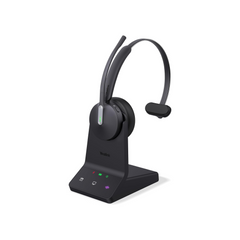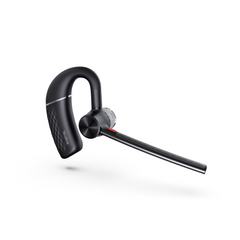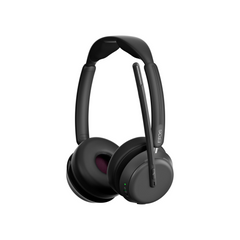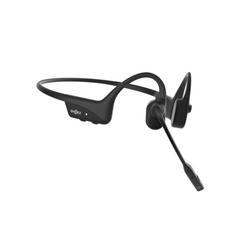It’s a headset jungle out there, and if you’re someone looking to outfit a team with headsets to meet your current and even future needs, you have your work cut out for you.
Finding the right headset can leave you feeling overwhelmed simply because there are so many different makes and models to choose from. When shopping around, here are some of the different types of headsets you’ll encounter in your search for new headsets:
- DECT headsets
- Bluetooth headsets
- PC headsets
- Wired Headsets
- Wireless Headsets
- Headsets for desk phones
- Earbuds
- Earpiece style headsets
- Mono headsets
- Duo headsets
- Convertible headsets
- UC headsets
- Teams headsets
- Headsets with Active Noise Cancellation
- Headsets for answering calls remotely
And there’s more.
So when it comes to wading through all the different makes and models to find one that’s compatible with the systems you use, including the right configuration, and at the price you’re wanting to pay, the exercise can be daunting.
Fortunately There’s Good News!
Headset Advisor is here to help make this process simple and easy. How’s that you ask? For starters, we created an informational video that helps to clear up some of this confusion. Drew takes you through the different types of headsets, explains the differences and offers guidance on which headset to select based on the devices you want to connect to.
We also offer free advice to help you navigate the maze of headsets, so you come away with the right headset that’s compatible with your situation. Contact us today for a personalized recommendation.
Feel free to read through this blog, watch the video below, or both. Either way, you should come away with a better understanding of business headsets and help to clear up some of the confusion while making your search a little easier.
3 Types To Explore
For the sake of this blog, I’m going to focus on the three different types of headsets commonly used in business.
- Headsets for use with desk phones
- Headsets for use with computers
- Headsets for use with mobile phones
That said, let’s start in by examining headsets for use with desk phones
Desk Phone Headsets

Looking back twenty years, desk phones were the dominant device used for making business calls. And though there are many desk phones still in use today, there’s been a steady shift towards making voice calls via computer, or VoIP. Even desk phones have migrated from being analog and digital to utilizing the internet for the connection, i.e., VoIP phones.
Whether your desk phone is analog, digital or VoIP, connecting a headset to it has remained much the same. The larger question when it comes to integrating a headset to a desk phone comes down to whether you’re looking for a wired, or wireless headset.
Wired
If you’re looking to keep costs down, and you don’t want employees on calls away from the desk, then a wired headset is a logical choice. That said, it’s important to make sure you get a headset that’s compatible with your phone as wired headsets need a compatible connection to the phone you’re using.
There are a number of different cords available, so you’ll want to get the one that’s designed for use with your headset and your phone make and model. We can provide guidance if needed, because if you get the wrong cord, you may find that your headset won’t work or you might experience unacceptable sound quality. Contact us today for a free recommendation.
Wireless
There’s a common misconception when it comes to wireless headsets. That misconception is when you buy a wireless headset, you’ll be able to answer and end calls when away from your desk. And though that’s a feature you’ll find for most wireless headsets, it’s not one that’s typically standard. In other words, the feature is normally available, but only when an optional accessory has been purchased. The accessory I’m referring to is:
- Handset Lifter (mechanically raises the phone receiver)
- Electronic Hookswitch Cable (EHS Cable) - electronically accesses incoming call
Which of these accessories is right for you depends on the headset make and model, as well as the phone make and model. My advice is to contact us here at Headset Advisor and let one of our knowledgeable, and friendly Advisors provide you with the information needed. This way, you avoid:
- Being disappointed that your wireless headset arrives without the remote call answering feature.
- Ending up with the wrong accessory
- Having to spend time going through the return and/or exchange process
Wireless headsets are wonderful devices because they give you the ability to talk hands free, and cord free. They allow you to freely move around your workspace untethered so you can collaborate with colleagues, grab a copy from the printer and they enhance your overall productivity, not to mention remote call answering helps to avoid phone messages, and the back-and-forth associated with it.
Headsets For Computers

As with headsets for desk phones, you can choose between a wired, or wireless headset for use with computers.
Wired models will come with:
- USB-A connector
- USB-C connector
- Or, USB-A and USB-C
So, depending on your computer port (USB-A, or USB-C), the headset should come with the corresponding USB adapter. Something to keep in mind when ordering a wired, or wireless headset. Recently, more headset manufacturers are including adapters for both USB-A, and USB-C use which helps to avoid returns, as well as accommodates both connections.
Wearing Styles
Computer headsets are available in models that are worn over the head, covering one or two ears, or, with some digging you may find a few models that are worn over the ear, and a few that offer a behind the neck band as an optional accessory.. The most widely used model are those worn over the head.
In most cases, using one of these computer headsets is pretty straightforward: Take it out of the box, plug it in, and you’re ready to go. You'll also want to download the free headset software for updating firmware, or making adjustments to the headset. Most of the major headset manufacturers offer this free software download.
If ease of use, and affordability are key considerations, then a wired USB headset will be your best choice.
Wireless Computer Headset

When using a wireless headset, you have the same wearing choices as you do with wired headsets.
Worth noting here is that most computer wireless headsets are Bluetooth, and these days, most computers are Bluetooth enabled. That has led many people to connect their Bluetooth headsets wirelessly to their Bluetooth computer. This is something we don’t recommend for several reasons. Instead, we’d recommend buying a computer headset that comes with a USB dongle. Here are the reasons why this is a better choice over connecting via Bluetooth:
- You’ll get longer wireless range
- You’ll have better call quality
- You’ll get a more reliable connection
- You’ll get access to more features
So, if these things are important to you, make sure to avoid connecting your Bluetooth computer headset to your Bluetooth enabled computer unless you’re using a USB dongle.
Multi-connectivity Wireless Headset
Some wireless headsets that are designed for use with computers, also allow you to connect to other devices, such as to desk phones and even mobile devices, the Yealink BH71 Workstation being one of the many models having this capability.
However, keep in mind that the Bluetooth in these headsets is in the base, and not in the headset. That means that you cannot use your headset with a mobile device outside of the range of the headset base.
One exception is the Yealink WH64 which is a unique headset in that it incorporates DECT and Bluetooth in the same headset, with the Bluetooth being in the headset.
The Yealink WH64 works with computers, desk phones, and it can be used in, or out of the office with mobile devices. And because it uses DECT technology, you’ll get other advantages over Bluetooth only headsets such as:
- 5-10 times the wireless range compared to Bluetooth
- A more secure conversation thanks to military grade encryption
- The ability to use more wireless headsets in a confined space without interference
So when it comes to selecting a wireless headset for use with computers, you’ll need to identify which devices besides computers (if any) you want to connect to. Then, select the wearing style, and lastly determine your budget because prices can vary a lot.
Headsets For Mobile Devices

That brings us to the topic of headsets for mobile devices, which comparatively, is pretty straightforward.
Mobile devices connect to headsets via Bluetooth so it stands to reason you’ll want to look for those that are Bluetooth. That search can lead you to earbuds, earpieces or those worn over the head. Whichever wearing style you choose, the connection is simple and quick.
Put your device and headset into the pairing mode, and within the device menu, select the headset you’re wanting to connect and you’re all set. You can fine tune things such as noise suppression, or audio settings for example, but to get up and running, that’s all it takes.
And, from a pricing perspective, Bluetooth headsets vary a lot with many priced under $100.00, while others can be as much as $400.00. So, knowing your budget will help limit your search to those models falling within your target price range.
Noise Is Distracting
If you face noise challenges, and you’re looking for solutions to help control it, I have a great recommendation you'll want to know about.
Anyone who’s using a computer for voice and/or video communications will be pleasantly surprised by the level of noise reduction provided by neep noise canceling software.
neep removes noise on both ends of the conversation so everyone can hear better without unwanted noise getting in the way. A free trial of neep is available by going to neep.com
So whether you’re using a headset, conference phone or any other audio device, neep will help clear up the noise leaving you with a better, more professional sounding call.
Help And Advice Is Nearby
As I mentioned before, if you’re uncertain about which headset is best for your situation, or maybe you have questions about which accessory is needed to provide remote call answering, then contact us for some helpful advice. We’ve been assisting customers with their communication needs for over 30 years. We're easy to reach, we're friendly and we have loads of great information to help simplify your research.






